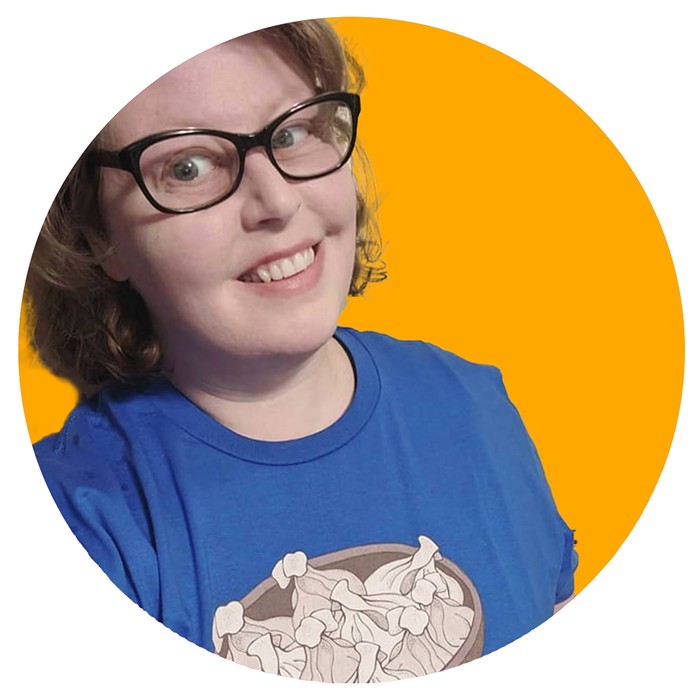On April 1, Couth Buzzard Books owner Theo Dzielak posted on the iconic 35-year-old bookstore's Facebook page: “After a prolonged period of struggle, the Couth Buzzard will be closing down permanently. It is financially unsustainable to keep going forward—and while that reality is painful, it must be faced. The hardest thing is that our community and staff are losing what has become a second home.”
But a group of musicians who play regularly live at the store, calling themselves Friends of the Buzzard, decided that they're not gonna take it. A GoFundMe campaign was swiftly organized to cover the store for another month and buy some time to regroup. The initial goal of $15,000 was met in an astonishing 12 hours, so the dollar amount was doubled. After a couple of days, the new goal’s been met as well. This buys the bookstore not one but two months of rent, bills, and wages for its several part-time employees.
“Now we have through May to reimagine the store and come up with a more profitable model,” Dzielak said from behind the counter, as he prepared a dirty chai. “Lots of people have come forward, and they’ve got some pretty interesting ideas.” His gentle voice could barely be heard over the espresso machine and the churning marimba-and-hand-drum circle performing a few yards behind us, and that’s wonderful. That’s what you want.
View this post on Instagram
Back in 1988, Gerry Lovchik opened Couth Buzzard Books about 10 blocks south on Greenwood Avenue North, next to Ken's Market. Lovchik wanted a name for his bookshop that implied a British pub, and, as Dzielak explains: “Couth is Middle English for well mannered. Buzzards are the recyclers of nature. At that time, the store only sold used books, so the books were recycled.”
I have sharp memories of wandering this enchanting book labyrinth as a kid, gazing up at the towering shelves and rummaging through bins of dogeared maps, while my dad searched for some book about Texas Hold ‘Em or the Civil War. Inhaling the smell of antique paper. Watching the dust motes hover in the sunlight over the stacks. A wonderland.
Dzielak, who’d managed the bookstore for years, bought it from Lovchik in 2008 after its lease was lost, and he reopened the following year at 8310 Greenwood Avenue. Penny Wight moved her cafe, Espresso Buono, into the store in the same transaction, co-owning the business with Dzielak until 2012.
The current space has more daylight and elbow room but is no less a wonderland, with cartoony hand-drawn signs for each book section and scads of quirky little postcards and ripped-out illustrations and Edwardian ephemera tacked up here and there, as all good used bookstores must. And then there’s the music.
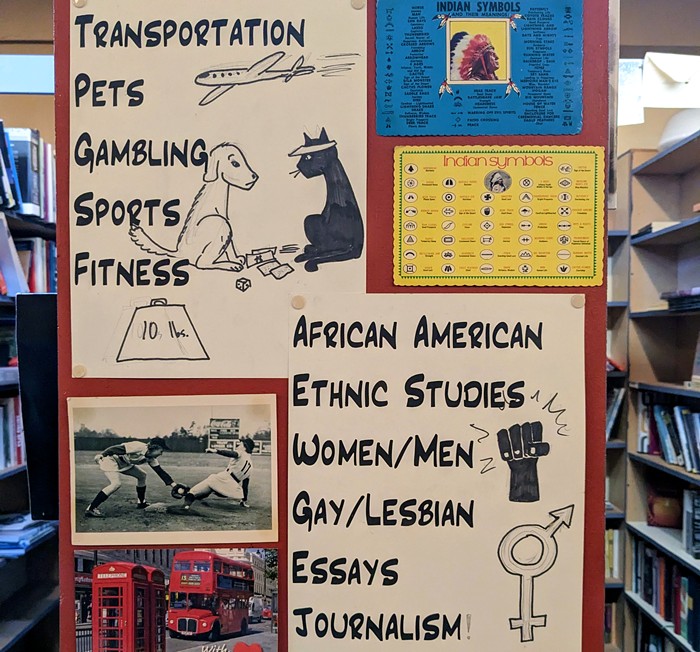
I really can’t get enough of these hand-cartooned signs. What a fairy tale. MEG VAN HUYGEN
Dzielak and Wight’s takeover also ushered in the shop’s era as equal parts bookseller and live music venue. In a 2008 article about the shop’s last “phoenix act” on the Westside Seattle blog, Dzielak said, “We'd love input from people on what they would like it to be. It's going to be much more than a bookstore." Boy, did he say a mouthful.
I’ll let the Friends of the Buzzard speak for me here. Chuck Gould, who once hosted the weekly open mic, says, “Theo, Sara [Depp, a musician and longtime employee], and the entire staff have been there for all of us in North Seattle and beyond in a special way, fulfilling a unique role that FOSTERED creativity. At the open mic, we got to watch a lot of people blossom. People who hadn't played for years broke out the old guitar-fiddle or mandolin and discovered they still had it. People who showed up and nervously fumbled through showing off what they had just learned at their ‘fourth ukelele lesson’ became increasingly competent and confident. Folks who initially needed a fake sheet to play a two-chord song turned out weeks in a row, and the poise and confidence grew... There are places that exist merely to make money, but then there are rare and special places like the Couth Buzzard that exist primarily to build community.”
The calendar at the Buzzard is packed every week. Not just a music venue, the back of the store is also used as a community organizing space, a meeting spot for Boy Scout troops and book clubs, a classroom for watercolor painting classes and foreign languages, and just a chillout place for coffee lovers, neighborhood laptoppers like me, and parents waiting for their kids to finish karate lessons next door. Oh, yeah, and the events are all kid-friendly too.
Couth Buzzard Books is on a very slim list of used bookstores in Seattle, a city once teeming with them. (RIP Puss n' Books, Beauty and the Books, Fillipi's, the Globe, all the now-closed locations of Twice Sold Tales, Spine and Crown, David Ishiii’s, Red and Black, Shorey’s, Abraxus, Epilogue, Bailey/Coy, Cinema Books, Astrology Et Al, Zanadu, Confounded Books, the Dreaming, Pistil Books… I could go on and on. [I know some of these weren’t used bookstores, but shhh. I still miss them.]) Couth Buzzard Books's name absolutely cannot be added to this bookstore hit list.
I feel like I’m 90 years old for saying this, but: Come on, you need real, physical, tangible used bookstores in your life. We have like a dozen of them left in the whole god-damned metropolis, and that number’s plummeting every year. New bookstores are great too, love ’em, but the element of randomness is what makes a used bookstore such a weird and marvelous haven to me. They’re little thrift shops of information, where you go to answer a question you didn’t know you had. This normal, beautiful, and enormously useful invention, once commonplace in our world, has nearly vanished.
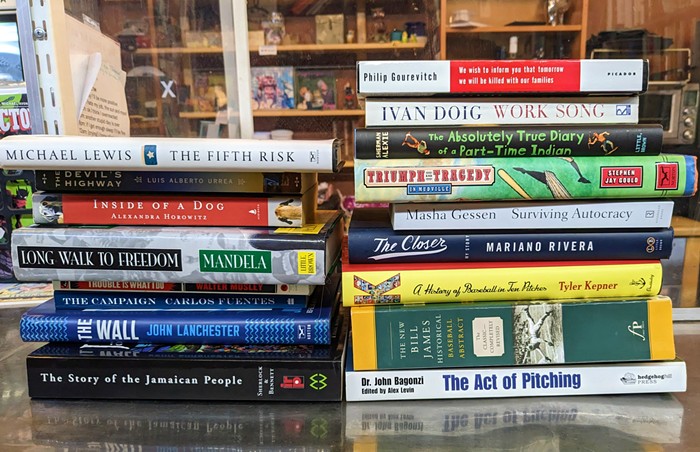
In addition to being a real, living bookstore that exists in the meatspace, the Buzzard’s also a crucial community center. As an employee, Ariel, tells me, over a rising cloud of live down-home country fiddle music from the back: “A lot of our patrons, especially who come to music nights, are older people, and as soon as the announcement was made, we immediately started hearing how detrimental this will be to their personal lives and mental health. For a lot of these people, they don't have another community to go to, where they can connect with other people. This is the only place they have. That’s what’s so incredible about Couth Buzzard, and why losing it would be so devastating.”
Ariel makes a great point, in that the city—all cities—needs places for older folks to socialize. I often write about how bars are important community spaces, but we also need all-ages community spaces that aren’t bars, where people can go during daylight hours and do art together—and "all ages" means senior-friendly as much as kid-friendly. These musicians and artists and writers who meet here weekly, this is their living room. If the Buzzard closes, where are they gonna get together and play the freakin’ mandolin? And connect and laugh and help one other? They'd have to start over. It's inhumane. This is how older folks die prematurely—from social isolation, due either to a slow or a sudden loss of community—and that’s not an exaggeration.
But of course, Ariel adds, “We’d also really love it if younger folks joined us here too! We just need to attract people, in general, and get the word out that there are community and arts events happening here every single day. That’s how we need people to think about this space, as a bookstore AND an events space.”
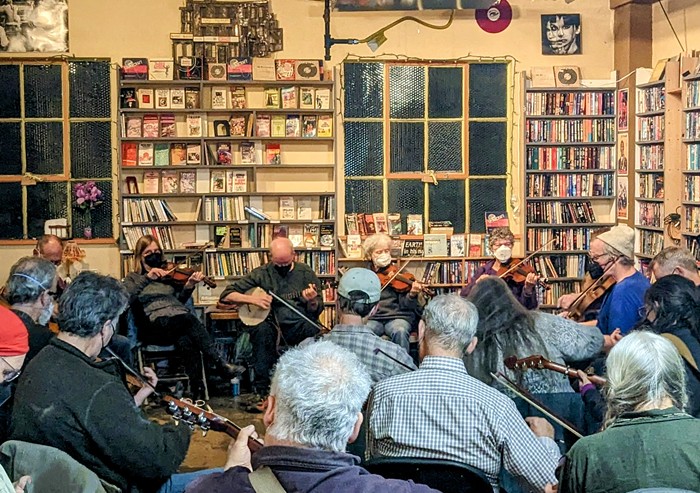
It’s nothing short of thrilling that the community came together to rescue the Buzzard—although it took a horror-movie jumpscare to do it—and so exciting to see how the shop will pivot to once again become profitable in the months ahead. In a city that's rapidly turning into a HardiePanel Amazon-locker CVS vape-scape, we need as many rad crunchy hippieshit used bookstores as we can hold on to here. Here’s what you can do to help:
1. Spread the word that Couth Buzzard Books is struggling and needs cash. Even if you don’t buy anything from them.
2. Buy things, obviously. Or just go into the store and just browse. But I promise you’ll leave with a book or snack or charming little trinket, and you’ll be so glad.
3. Don’t give money to Amazon, which puts every kind of indie shop out of business these days but began with the widespread slaughter of booksellers. Which the Buzard miraculously survived, only to almost get wiped out now! Amazon’s still a major threat to its—and all retailers’—continued survival. You can buy almost anything online from a non-Amazon seller, usually as cheaply or even cheaper, since all retailers have to compete with Amazon. It takes five extra seconds. Try it.
4. Go to an event at Couth Buzzard! They’re free, they’re happening every single day, and they’re all adorable. The musical events are particularly impressive. Everyone’s pro-level!
5. Donate to the GoFundMe here. Every penny helps.
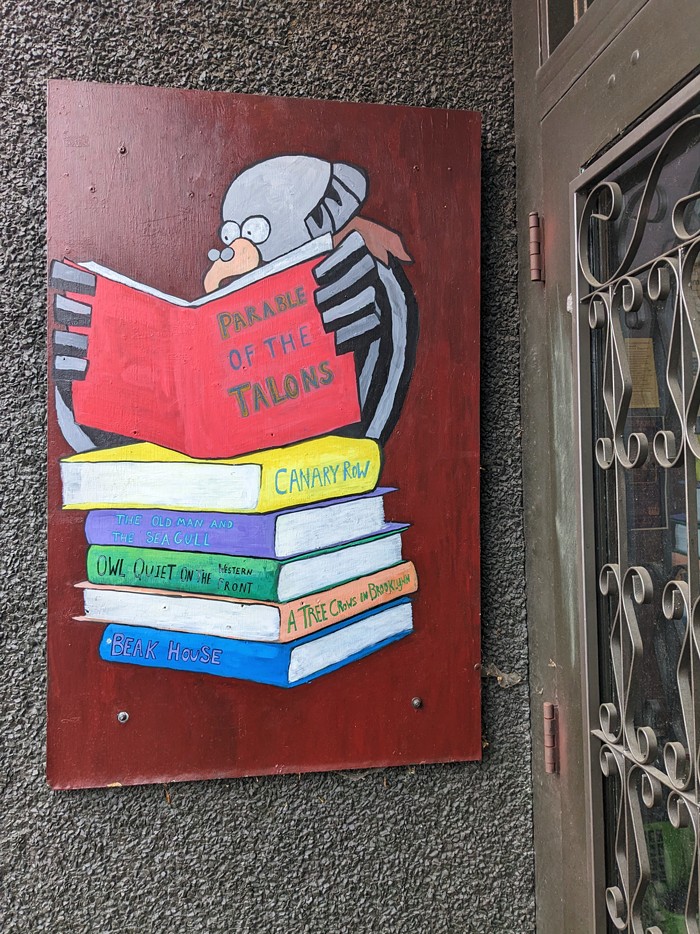
I get it. None of us went anywhere for three years, and you kinda forget about decades-old businesses even existing. But as the pandemic has taught us, NOTHING IS FOREVER. So please, god, go to Couth Buzzard Books, buy books, buy a coffee or a tea or a beer or a glass of wine, buy another one, buy a little handmade porcelain magnet or something, check out a Spanish-language discussion night or a painting class or a tango music sesh, and support this precious community space beyond this rescue mission! The Buzzard lived, and we're gonna keep it that way. Get in, losers—we're going bookshopping.

